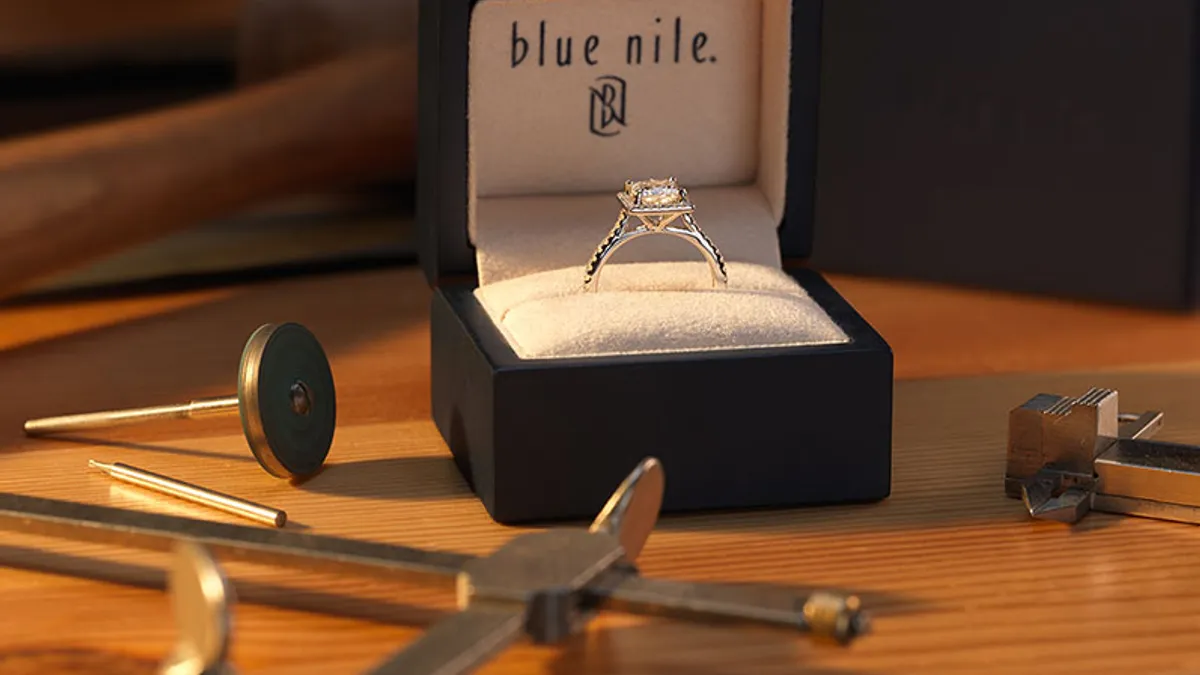Dive Brief:
- Signet Jewelers has struck a deal to acquire rival Blue Nile for $360 million in cash, according to a press release and securities filing.
- Signet said in the release that the acquisition “accelerates Signet’s efforts to expand its bridal offerings and grow its Accessible Luxury portfolio while extending its digital leadership in the jewelry category.”
- The deal, expected to close in the third quarter, follows Signet’s $490 million acquisition of Diamonds Direct last year.
Dive Insight:
In announcing the deal for Blue Nile, Signet noted the latter’s “attractive customer demographic that is younger, more affluent, and ethnically diverse which will broaden our customer acquisition funnel.”
Signet CEO Virginia Drosos also praised Blue Nile’s online experience and said the acquisition would help Signet expand customer choice, build new capabilities and reap unspecified “meaningful operating synergies.”
Blue Nile made roughly half a billion dollars in sales during the 2021 calendar year, according to Signet. The company expects benefits from the acquisition to become accretive next year.
In a recent analysis, Cowen analysts said they were “impressed by the assortment of fine jewelry SKU's” at Blue Nile, which they also said had strong omnichannel execution along with fellow digital native Brilliant Earth. At the same time, Blue Nile had the lowest EBITDA margin (1.8%) compared to Brilliant Earth and Signet, which both measure above 13% in the metric, according to Cowen.
Once the deal is done, Blue Nile will catapult to the top of Signet’s luxury banners, which also include Jared, James Allen and the recently purchased Diamonds Direct.
Founded in 1999 to take diamond sales online, Blue Nile was taken over by private equity firm Bain Capital and other investors in 2017 for roughly half a billion dollars — a hefty chunk more than what Signet is paying for the company.
Blue Nile was set in June to go public through a merger with Mudrick Capital Acquisition Corporation II, a special purpose acquisition company. That deal implied an enterprise value of about $683 million for Blue Nile — again, more than what Signet just agreed to pay.
Signet’s play for Blue Nile comes as the retailing environment toughens. Signet, in the same release announcing the Blue Nile deal, dropped its guidance on both sales and operating income for the fiscal year.
“We saw sales soften in July as our customers have been increasingly impacted by rapid inflation, so we’re revising guidance to align with these trends,” Drosos said. The new guidance doesn’t account for the possibility of worsening economic conditions, or the Blue Nile acquisition, which Signet is making with cash on hand.
Joan Hilson, Signet’s chief financial and strategy officer, said in the release, “While our initial guidance for [fiscal year 2023] anticipated the impact of stimulus in the base period and the level of inflation that we were seeing at that time, we have seen a further deterioration in consumer spending, including at higher price points, in July.”
Hilson also noted that the company’s reduced guidance still includes an operating margin in double digits “based on the strength of our transformed business model.”















